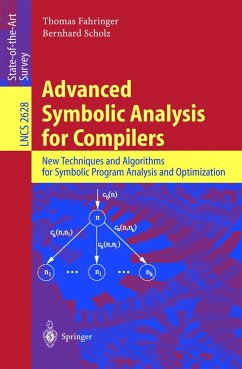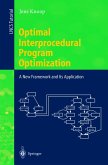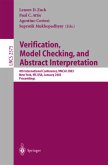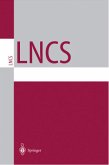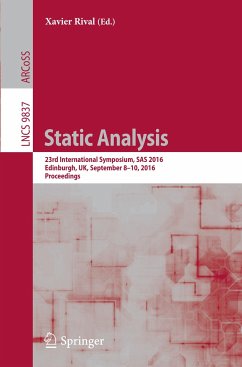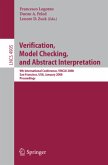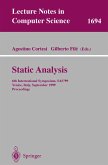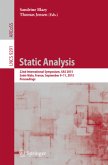This book presents novel symbolic control and data flow techniques as well as symbolic techniques and algorithms for program analysis and program optimization. Program contexts, defining a new symbolic description of program semantics for control and data flow analysis, are at the center of the techniques and methods introduced.
The authors develop solutions for a number of problems encountered in program analysis by using program contexts. The solutions proposed are efficient, versatile, unified, and more general than most existing methods.
The authors' symbolic analysis framework is implemented as a prototype as part of the Vienna High Performance Compiler.
The objective of program analysis is to automatically determine the p- perties of a program. Tools of software development, such as compilers, p- formance estimators, debuggers, reverse-engineering tools, program veri?- tion/testing/proving systems, program comprehension systems, and program specializationtoolsarelargelydependentonprogramanalysis. Advancedp- gram analysis can: help to ?nd program errors; detect and tune performan- critical code regions; ensure assumed constraints on data are not violated; tailor a generic program to suit a speci?c application; reverse-engineer so- ware modules, etc. A prominent program analysis technique is symbolic a- lysis, which has attracted substantial attention for many years as it is not dependent on executing a program to examine the semantics of a program, and it can yield very elegant formulations of many analyses. Moreover, the complexity of symbolic analysis can be largely independent of the input data size of a program and of the size of the machine on which the program is being executed. In this book we present novel symbolic control and data ?ow repres- tation techniques as well as symbolic techniques and algorithms to analyze and optimize programs. Program contexts which de?ne a new symbolic - scription of program semantics for control and data ?ow analysis are at the center of our approach. We have solved a number of problems encountered in program analysis by using program contexts. Our solution methods are e?cient, versatile, uni?ed, and more general (they cope with regular and irregular codes) than most existing methods.
Hinweis: Dieser Artikel kann nur an eine deutsche Lieferadresse ausgeliefert werden.
The authors develop solutions for a number of problems encountered in program analysis by using program contexts. The solutions proposed are efficient, versatile, unified, and more general than most existing methods.
The authors' symbolic analysis framework is implemented as a prototype as part of the Vienna High Performance Compiler.
The objective of program analysis is to automatically determine the p- perties of a program. Tools of software development, such as compilers, p- formance estimators, debuggers, reverse-engineering tools, program veri?- tion/testing/proving systems, program comprehension systems, and program specializationtoolsarelargelydependentonprogramanalysis. Advancedp- gram analysis can: help to ?nd program errors; detect and tune performan- critical code regions; ensure assumed constraints on data are not violated; tailor a generic program to suit a speci?c application; reverse-engineer so- ware modules, etc. A prominent program analysis technique is symbolic a- lysis, which has attracted substantial attention for many years as it is not dependent on executing a program to examine the semantics of a program, and it can yield very elegant formulations of many analyses. Moreover, the complexity of symbolic analysis can be largely independent of the input data size of a program and of the size of the machine on which the program is being executed. In this book we present novel symbolic control and data ?ow repres- tation techniques as well as symbolic techniques and algorithms to analyze and optimize programs. Program contexts which de?ne a new symbolic - scription of program semantics for control and data ?ow analysis are at the center of our approach. We have solved a number of problems encountered in program analysis by using program contexts. Our solution methods are e?cient, versatile, uni?ed, and more general (they cope with regular and irregular codes) than most existing methods.
Hinweis: Dieser Artikel kann nur an eine deutsche Lieferadresse ausgeliefert werden.
From the reviews:
"This book is about program analysis. ... the book is an in depth foray in symbolic analysis completed by an impressive and extensive discussion on the up to date references and related research work. ... The book is addressed to computer science researchers and students interested in program analysis. Compiler engineers and other developers for software development tools would find this book as a valuable source of ideas and references." (Corneliu Bârsan, Zentralblatt MATH, Vol. 1042 (17), 2004)
"This book is about program analysis. ... the book is an in depth foray in symbolic analysis completed by an impressive and extensive discussion on the up to date references and related research work. ... The book is addressed to computer science researchers and students interested in program analysis. Compiler engineers and other developers for software development tools would find this book as a valuable source of ideas and references." (Corneliu Bârsan, Zentralblatt MATH, Vol. 1042 (17), 2004)

